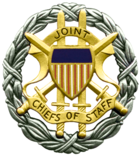Joint chiefs of staff
| Joint Chiefs of Staff | |
|---|---|
| JCS | |

|
|
| Role | Advisory board providing professional military advice to the Secretary of Defense and the President |
| Established in practice | 1942 |
| Constituting instrument |
National Security Act of 1947 currently codified at 10 U.S.C. § 151 |
| Predecessor entities | Joint Board (1903–1942) |
| Chairman | Joseph Dunford |
| Vice Chairman | Paul J. Selva |
| Number of members | Seven |
| Parent agency | U.S. Department of Defense |
| Staff organization | The Joint Staff (For the Chairman and the Vice Chairman; the service chiefs and the NGB chief have their own staffs assisting them) |
| Seat | The Pentagon |

|
|
| Agency overview | |
|---|---|
| Formed | 1949 |
| Headquarters | The Pentagon |
| Employees | Approx. 1,500 |
| Agency executive |
|
| Parent agency | Department of Defense |
The Joint Chiefs of Staff (JCS) is a body of senior uniformed leaders in the United States Department of Defense who advise the President of the United States, the Secretary of Defense, the Homeland Security Council and the National Security Council on military matters. The composition of the Joint Chiefs of Staff is defined by statute and consists of the Chairman of the Joint Chiefs of Staff (CJCS), Vice Chairman of the Joint Chiefs of Staff (VCJCS), and the Military Service Chiefs from the Army, Marine Corps, Navy, Air Force, and the Chief of the National Guard Bureau, all appointed by the President following Senate confirmation. Each of the individual Military Service Chiefs, outside of their Joint Chiefs of Staff obligations, works directly for the Secretary of the Military Department concerned, i.e., Secretary of the Army, Secretary of the Navy, and the Secretary of the Air Force.
Following the Goldwater–Nichols Act in 1986, the Joint Chiefs of Staff do not have operational command authority, neither individually nor collectively, as the chain of command goes from the President to the Secretary of Defense, and from the Secretary of Defense to the Commanders of the Combatant Commands. Goldwater–Nichols also created the office of Vice Chairman, and the Chairman is now designated as the principal military adviser to the Secretary of Defense, the Homeland Security Council, the National Security Council and the President.
...
Wikipedia
